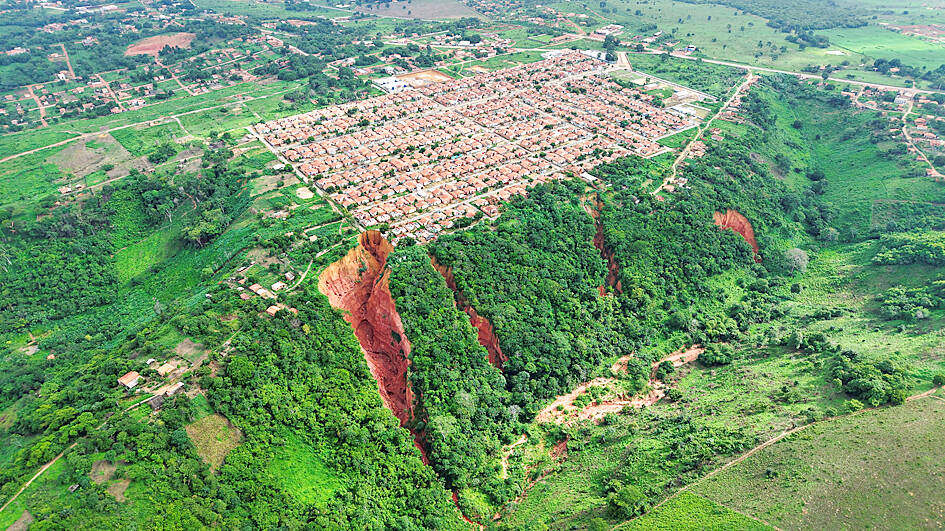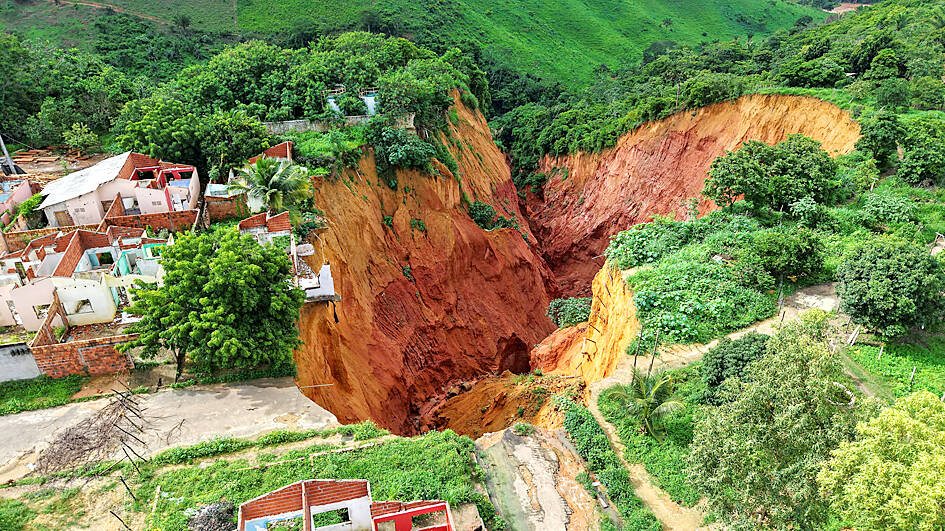The city of Buriticupu, in the northeastern tip of the Brazilian Amazon, is being slowly swallowed by the earth. In the past few weeks, huge sinkholes, several meters deep, have led the municipal government to declare a state of emergency.
About 1,200 people of the 55,000 population are at risk of having their homes tip into the widening abyss.
“In the space of the last few months, the dimensions have expanded exponentially, approaching substantially closer to the residences,” an emergency decree issued by the city government earlier this month said about the sinkholes.

Photo: Reuters
Several buildings have already been destroyed, the decree said.
The recent sinkholes are an escalation of a problem that residents of Buriticupu, in Maranhao state, have been watching unfold for the past 30 years, as rains slowly erode soils made vulnerable by their sandy nature, plus a combination of poorly planned building work and deforestation.
The large soil erosions are known in Brazil as “vocoroca,” a word of indigenous origins that means “to tear the earth” and is the equivalent of sinkholes.

Photo: Reuters
The problem becomes worse in periods of heavy rain such as the current one, said Marcelino Farias, a geographer and professor at the Federal University of Maranhao.
Antonia dos Anjos, who has lived in Buriticupu for 22 years, fears more sinkholes will soon appear.
“There’s this danger right in front of us, and nobody knows where this hole has been opening up underneath,” the 65 year old said.
Buriticupu Secretary of Public Works Lucas Conceicao, an engineer, said the municipality clearly does not have the capacity to find solutions for the complex sinkhole situation.
“These problems range from the erosion processes to the removal of people who are in the risk area,” he said.

South Korea would soon no longer be one of the few countries where Google Maps does not work properly, after its security-conscious government reversed a two-decade stance to approve the export of high-precision map data to overseas servers. The approval was made “on the condition that strict security requirements are met,” the South Korean Ministry of Land, Infrastructure and Transport said. Those conditions include blurring military and other sensitive security-related facilities, as well as restricting longitude and latitude coordinates for South Korean territory on products such as Google Maps and Google Earth, it said. The decision is expected to hurt Naver and Kakao

THE TRAGEDY OF PUNCH: Footage of the seven-month-old Japanese macaque has gone viral online after he was rejected by his mother and formed a bond with a soft toy A baby monkey in Japan has captured hearts around the world after videos of him being bullied by other monkeys and rejected by his mother went viral last week. Punch, a Japanese macaque, was born in July last year at Ichikawa City Zoo. He has drawn international attention after zookeepers gave him a stuffed orangutan toy after he was abandoned by his mother. Without maternal guidance to help him integrate, Punch has turned to the toy for comfort. He has been filmed multiple times being dragged and chased by older Japanese macaques inside the enclosure. Early clips showed him wandering alone with

MONEY GRAB: People were rushing to collect bills scattered on the ground after the plane transporting money crashed, which an official said hindered rescue efforts A cargo plane carrying money on Friday crashed near Bolivia’s capital, damaging about a dozen vehicles on highway, scattering bills on the ground and leaving at least 15 people dead and others injured, an official said. Bolivian Minister of Defense Marcelo Salinas said the Hercules C-130 plane was transporting newly printed Bolivian currency when it “landed and veered off the runway” at an airport in El Alto, a city adjacent to La Paz, before ending up in a nearby field. Firefighters managed to put out the flames that engulfed the aircraft. Fire chief Pavel Tovar said at least 15 people died, but

Australian Prime Minister Anthony Albanese yesterday said he did not take his security for granted, after he was evacuated from his residence for several hours following a bomb threat sent to a Chinese dance group. Albanese was evacuated from his Canberra residence late on Tuesday following the threat, and returned a few hours later after nothing suspicious was found. The bomb scare was among several e-mails threatening Albanese sent to a representative of Shen Yun, a classical Chinese dance troupe banned in China that is due to perform in Australia this month, a spokesperson for the group said in a statement. The e-mail